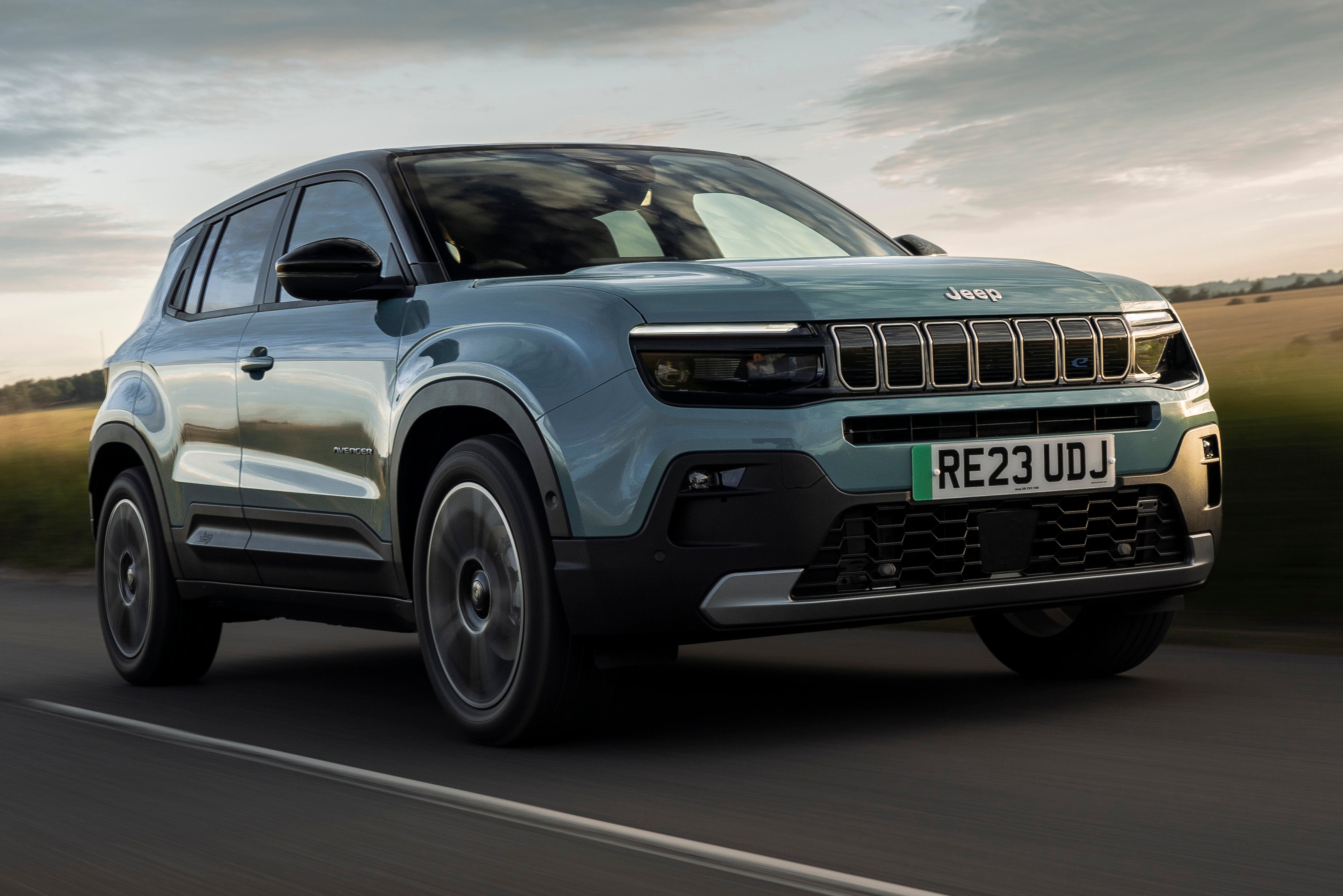Jeep Avenger Electric Review 2025: Price, specs & boot space
Written by Ivan Aistrop
Quick overview
Pros
- Funky styling and cheerful attitude
- Really good to drive
- Decent value for money
Cons
- Limited practicality
- Too many low-rent cabin plastics
- Poor safety rating
Verdict: Is the Jeep Avenger Electric a good car?
"The electric Jeep Avenger is a really impressive little car, with excellent driving manners, perky electric performance and a competitive driving range. It isn’t perfect, with a cheap-feeling interior and limited practicality counting against it, but in pretty much every other respect it makes a very compelling case for itself."
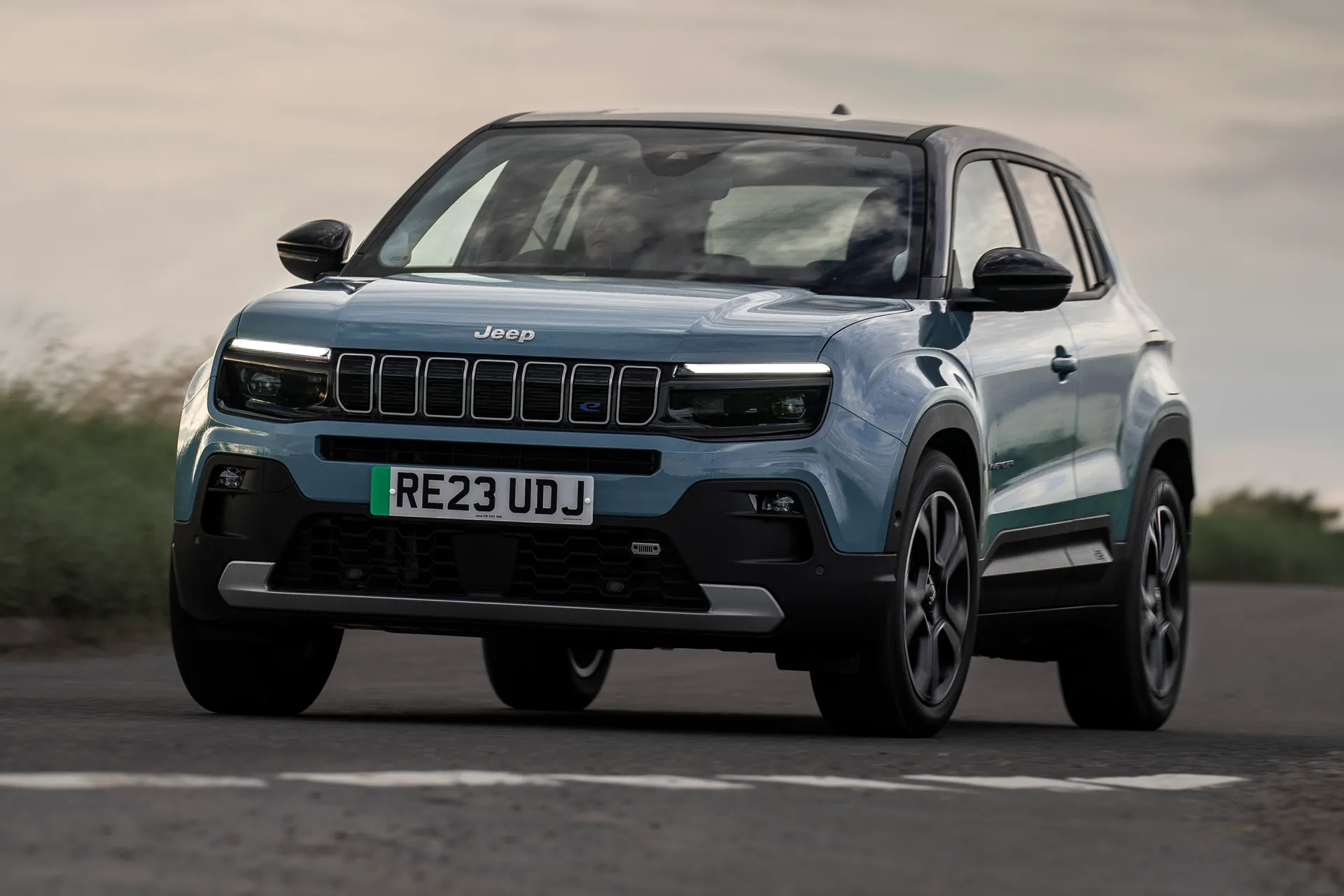
It might seem a little odd that Jeep has given such an aggressive and confrontational name to a car as small, charming and likeable as the Avenger. Just look at it – it’s too cute to avenge anything, bless it.
But when you think about it, the name is quite fitting. Despite its diminutive size, the Jeep Avenger considers itself to be rugged, plucky, no-nonsense and not to be messed with. Think about Scrappy Doo in the old Scooby cartoons shouting “Lemmie at ‘em!” in the face of larger, more imposing adversaries – that’s how we see the character of the Jeep Avenger.
However, if the Jeep Avenger plans to shout its mouth off in such a way, it needs to back up the bluster. As Jeep’s first all-electric car, this teeny-tiny crossover SUV has plenty of pressure riding on its small shoulders, So, can it deliver?
Well, the Jeep Avenger certainly has the style to appeal in this image-conscious sector of the car market. All those classic Jeep design cues give it a cute brand of ruggedness that’s missing from other supermini-sized SUVs, electric or otherwise, so it really stands out. The interior is a cheerful environment, too, thanks to big splashes of colour and lots of light coming through the big windows, although the quality of the cabin materials trails that of most rivals.
The Jeep Avenger is not the SUV to pick if you’re after ultimate practicality, either. This is a small car with a small footprint, so rear space and boot space are inevitably very limited. On the plus side, there’s a decent amount of standard equipment included in the price (which is very reasonable by class standards), and the large central touchscreen – along with the rest of the controls – is easy and intuitive to use.
What might surprise you most, though, is what a pleasure the Jeep Avenger Electric is to drive. It combines zippy electric performance with tidy, nimble handling and a comfy ride, and although it’s at its best on tight city streets, it doesn’t feel out of its depth on the motorway.
The official WLTP range figure for the Jeep Avenger Electric of 244 miles is competitive if not class-leading, and with DC rapid charging of up to 100kW supported, it can take on charge reasonably quickly, too.
All in all, in the scheme of small electric SUVs, the Jeep Avenger is a very likeable, very capable and very compelling choice, and if you're looking for such a car, it should be very near the top of your shortlist. A big price cut in late 2024, taking it to less than £30,000 new, is icing on the cake.
If you're looking for the hybrid version, you'll need our Jeep Avenger e-Hybrid Review.
Looking for a used car for sale? We've got 100s of Jeep Approved Used Cars for Sale for you to choose from, including a wide range of Jeep Avenger models for sale.
Is the Jeep Avenger Electric right for you?
If you’re considering a small SUV, it’s likely that you’re wanting to combine eye-catching style with a little bit of everyday practicality. If the former is the more important factor for you, then the Avenger will probably be right up your street. If it’s the latter that takes preference, however, it probably won’t. Moreover, if you’re considering such a car with an all-electric drivetrain, you’re probably after affordable costs and a decent range, and on both those scores, you could do a lot worse than the Avenger.
What’s the best Jeep Avenger Electric model/engine to choose?
There’s only one electric powertrain option for the Jeep Avenger. All versions get a 156PS electric motor and a 54kWh battery pack giving an official range of 244 miles, so there’s not much of a choice to be made there.
In terms of trim, there are three to choose from with the Jeep Avenger: Longitude, Altitude and Summit. The entry-level car is reasonably well-equipped as standard, but it does miss out on adaptive cruise control, a powered hands-free tailgate, a leather-effect steering wheel and a bigger driver display. These are all boxes checked by the mid-range Altitude car, so that’s probably the one you’ll want to go for. The range-topping Summit adds more goodies such as heated front seats and some extra safety kit, but it’s a good chunk more expensive.
What other cars are similar to the Jeep Avenger Electric?
Mechanically, there are several cars all but identical to the Avenger Electric, since it rides on the same platform as other models from the Stellantis group, including the Peugeot e-2008, the Vauxhall Mokka Electric, the Fiat 600e, the DS3 E-Tense, and most recently, the Alfa Romeo Junior Elettrica. They all offer similar range and performance but with distinctly different styling inside and out. Other rivals like the Hyundai Kona Electric don’t share the same underpinnings, but are broadly similar in execution.
Conceptually though, not a lot matches the Avenger. By distilling Jeep characteristics into a small electric SUV it has a unique and quite appealing feel. None of its rivals have the same bluff, in-your-face style or rugged attitude of the Avenger, and while you probably wouldn’t want to go too far off-road in the Jeep, you won’t even want to try in any of the others.
Comfort and design: Jeep Avenger Electric interior
"Not the poshest-feeling cabin in the class, and not the roomiest or most practical, either. However, the Averger’s interior still manages to feel irrepressibly cheery, and the ergonomics, infotainment and visibility are all areas of strength."
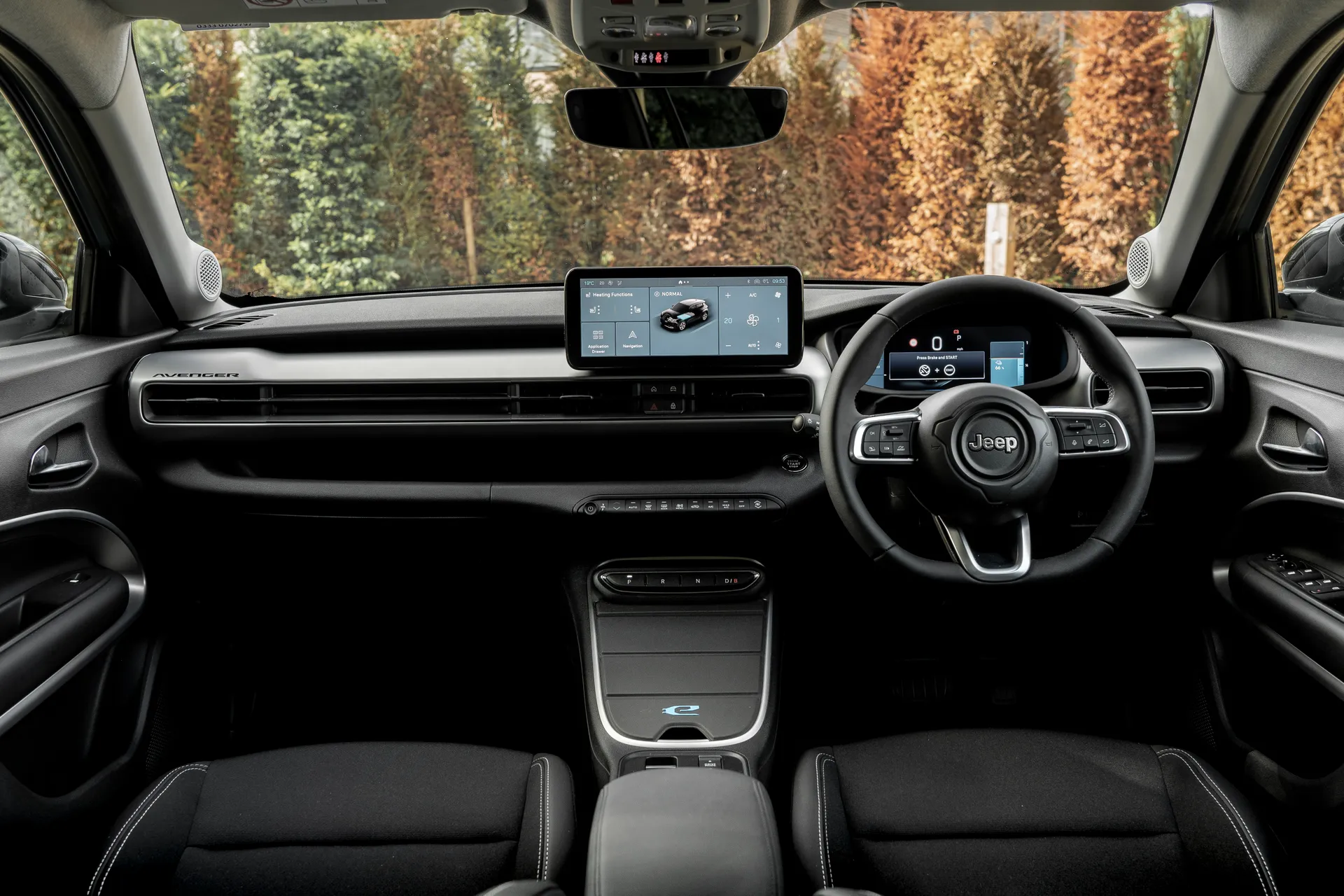
Finding a comfy driving position in the Jeep Avenger is easy, because there’s a good range of adjustment in both the driver’s seat and the steering wheel. These adjusters are manual on all versions, although you can add powered front seats to the Altitude and Summit cars as an option, albeit for a steep four-figure sum.
Wherever you set your seat, your forward visibility is great, with slim pillars either side of the windscreen, and the flush-sided design of the car making it easy to see where the extremities of the bonnet and body are. Your over-the-shoulder view isn’t quite as clear, with far thicker pillars flanking the rear screen, but you get reversing sensors as standard, and parking such a small car is still a doddle.
The dashboard design is nice and simple, with a neat line of buttons and rocker switches taking care of operating the air-con, meaning you don’t have to delve into touch screen menus. Perhaps, the best thing, though, is the impressive amount of storage in the front of the Avenger. There’s a deep cubby beneath the armrest, another with a magnetic lid at the base of the dashboard, a couple of cupholders, big door bins and a decent glovebox.
Quality and finish
The Jeep Avenger’s cabin is dominated by hard, scratchy, cheap-feeling plastics. Indeed, search around the cabin with prying fingertips and you’ll do well to find a single surface that’s in any way cushioned or tactile. However, while in many cars that leads to a dour and drab feel, nothing could be further from the truth in the Avenger, because things still manage to feel disproportionately cheery inside the car. That’s probably due to the combination of the large, tall windows letting plenty of light in, and the colourful piece of (usually body-coloured) trim running horizontally along the width of the dashboard, injecting a splash of much-needed colour. It can’t match the poshest-feeling small SUVs for quality, but it’s an entirely inoffensive place to sit.
Infotainment: Touchscreen, USB, nav and stereo in the Jeep Avenger Electric
All three trim levels come with the same 10.25-inch Uconnect central infotainment touchscreen. While infotainment has traditionally been an area of weakness for Jeep, this latest system is much easier to use than those that went before, with logical menus, sharp graphics and fast responses to your various prods and presses. The screen is also well positioned high up on the dashboard, so it’s easy to see and reach.
The system supports most of the functionality you'd expect, but it’s perhaps a little surprising that you have to pay extra for sat-nav on every model, and it comes as part of a relatively expensive option pack. We wouldn’t bother, because the system includes Apple CarPlay and Android Auto as standard, so you might as well just hook up your phone and let that take care of navigation duties.
The entry-level Longitude version gets a 7.0-inch digital drivers display, but in Altitude trim and upwards, this is upgraded to a 10.25-inch display, which also offers a good level of configurability. You also get a USB-C port for the second row, while the Summit adds wireless phone charging.
Space and practicality: Jeep Avenger Electric boot space
The Jeep Avenger is not the SUV you buy if you're looking for ultimate practicality, because it’s extremely small, and although it’s reasonably well packaged, there’s only so much that can be done with such a small footprint. The front seats are fine, with enough space for tall adults, but in the back things feel a lot tighter. The limited legroom means that anyone approaching six feet in height will have their knees wedged against the seat in front, although the high roof means they’ll be fine for headroom. The narrow cabin also means that the three-seat rear bench is actually best for two people – if you try and squeeze a third in, then nobody will be particularly comfortable.
The 355-litre boot isn’t huge, either, although it does impress in other ways. The tall, wide opening means access is good, and with the moveable boot floor in its higher setting, there’s also barely any load lip. This also gives you enough underfloor storage for your charging cables – handy when there’s no additional storage under the bonnet – and levels off the step in the load area when you fold the 60/40 split rear seats.
Handling and ride quality: What's the Jeep Avenger Electric like to drive?
"The Avenger isn’t the fastest electric car by any stretch, but it does have perky performance, complemented by an impressively zippy feel, especially around town. Happily, though, this doesn’t come at the expense of a comfortable ride."
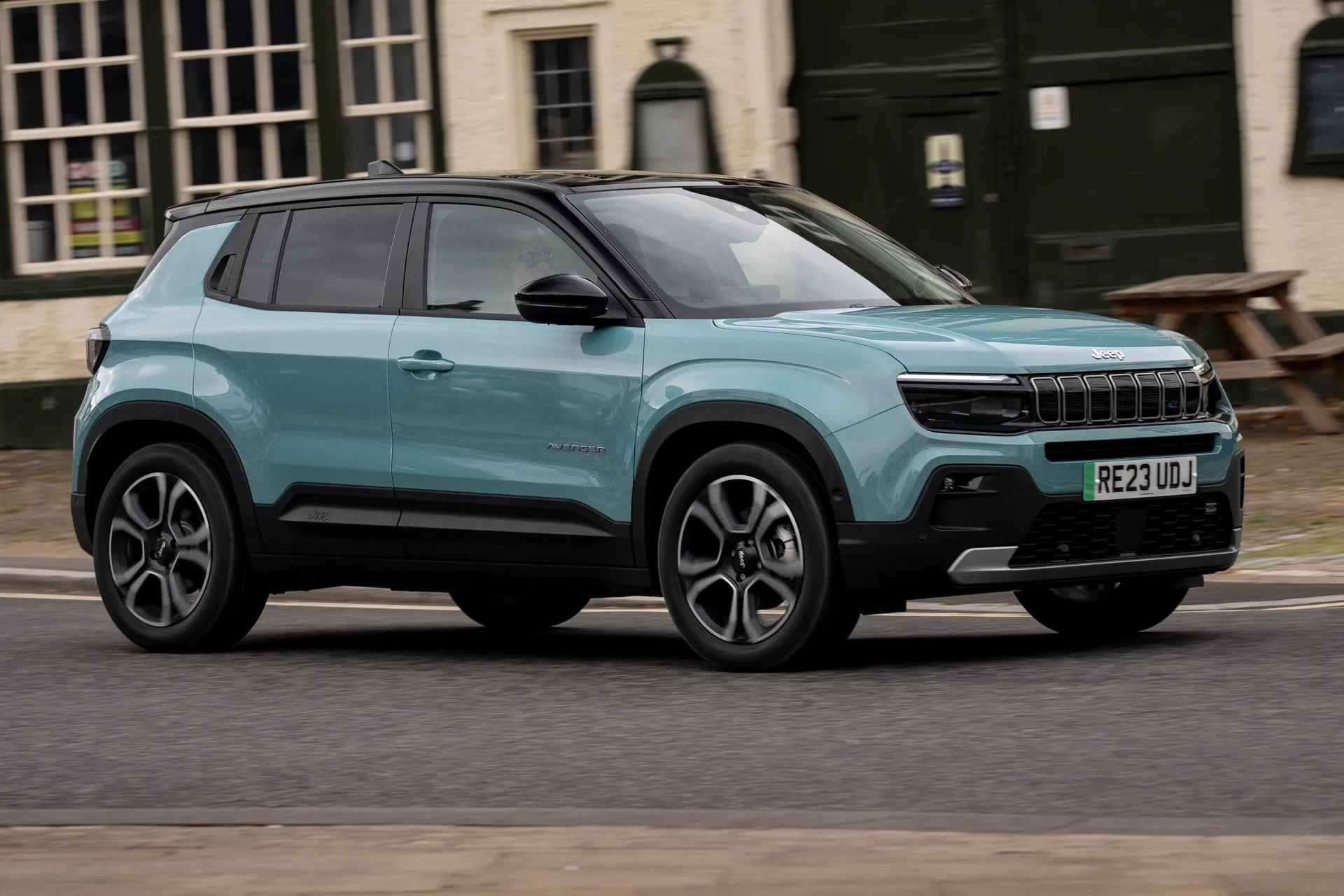
The Jeep Avenger is at its best in an urban setting, where its perky acceleration, compact dimensions, light steering and tight turning circle make it a doddle to thread along narrow and congested streets. The suspension delivers really good body control, which helps towards the Averger’s zippy feel, but happily, this doesn’t result in an overly firm ride, with the suspension doing a good job of mopping up most bumps and ruts at low speeds.
Go a bit faster and that tight body control also helps when changing direction, and there’s plenty of grip to call upon. However, that light steering that was such a boon in town works against the Jeep Avenger here, because it means you feel a little less involved in the action. Things always feel stable and predictable, though, and the ride also stays comfy at higher speeds.
Being a Jeep, the Avenger needs to have at least some off-roading ability. It’s front-wheel-drive only, so you won’t be traversing the north face of the Eiger, but some concessions are made to the notion of off-roading. There’s more ground clearance than on most small crossovers, and the short overhangs and flush sides mean approach and departure angles are actually pretty decent. The car also comes with hill descent control, along with various all-terrain modes that prime the traction control system to cope with various types of loose surface.
What motors and batteries are available in the Jeep Avenger Electric?
All versions of the Jeep Avenger get the latest version of the Stellantis group’s electric powertrain and this pairs a 54kWh battery pack (51kWh of which is usable capacity) with an electric motor developing a maximum 156PS and 260Nm of torque. We say ‘a maximum’, because the power level you actually get depends on which of the three main driving modes you select. Sport mode gives you the lot, allowing a 0-62mph sprint time of 9.6 seconds. However, stick with the car’s default Normal mode, and you only get served up 110PS, while selecting Eco mode limits the output to just 82PS to preserve charge and maximise range.
Things can feel a little pedestrian in Eco mode, but it’s fine for pottering gently around town, although you might want to switch modes when trying to nip into small gaps in city traffic. Normal mode feels fine for most sorts of driving, and you’ll easily keep pace with the ebb and flow of traffic, even on the motorway. Sport mode, meanwhile, doesn’t exactly turn the Avenger into some sort of rocketship, but it is nice to have the option of that little bit of extra punch when you need it. Once the initial extra hit of acceleration when you first put your foot down is done and dusted, however, acceleration feels much the same as in Normal mode.
Jeep Avenger Electric range: How far can you travel on a charge?
Official figures put the Avenger’s maximum average battery range at 244 miles on a full charge, while Jeep claims the car will do more like 340 miles if confined to city use.
As always, these figures shouldn’t be taken as gospel, because they are arrived at by laboratory tests, and in the real world, the range you get will be affected by a variety of different variables. Drive your car at constant high speeds in cold temperatures, for example, and you’ll get far less range than you would pootling around city streets at the height of summer. Even in a best-case weather scenario, we reckon you’d do well to crack 200 miles in mixed driving conditions, and in the cold, we wouldn’t bank on much more than 150 miles.
You can reduce your car’s power usage by driving around in Eco mode as much as you can, and putting the transmission into B mode dials up the level of regenerative braking, harvesting kinetic energy during deceleration and feeding it back into the battery. Even when dialled up to the max, though, the level of regen is pretty light compared with electric cars that provide a more severe ‘one-pedal’ effect, so you’ll often still have to use the traditional friction brakes to slow down enough.
Refinement and noise levels
At low urban speeds, the Avenger is extremely quiet, pootling along with barely a whisper from any source. Things stay quiet up to and including middling speeds, but go a bit faster on A-roads and motorways and you’ll start to hear some rumble from the tyres. The upright shape of the car’s front end also results in some wind noise, especially around the windscreen. Even in those circumstances, though, you’ll barely hear a peep out of the electric motor.
Safety equipment: How safe is the Jeep Avenger Electric?
Euro NCAP awarded the Jeep Avenger a slightly disappointing three stars for safety when it was crash tested in 2024. It's not entirely bad news, though - it scored relatively highly for adult (79%) and child (70%) occupants, but lost scores for its protection of vulnerable road users (59%) and for its safety assist systems (53%).
The good news is that the level of standard safety kit you get on the Avenger is mostly the same regardless of which of the three trim levels you choose. The standard roster includes six airbags, three sets of Isofix child seat mounting points (front passenger seat and outer rear seats), automatic emergency braking, lane departure warning, intelligent speed assist and E-Call automatic emergency response.
The exception to that rule regards cruise control. The Longitude version gets a regular manual system, while Altitude gets an adaptive system, and Summit gets an upgraded system that also includes lane centring and traffic jam assist.
Jeep Avenger Electric charging times: How much does it cost to charge?
"The Avenger supports a maximum DC rapid charging rate of 100kW, so at a sufficiently powerful public charger, you can add a 20-80% charge in as little as 24 minutes. The same charging station will add 18 miles of range, which Jeep says is the average daily requirement, in just three minutes."
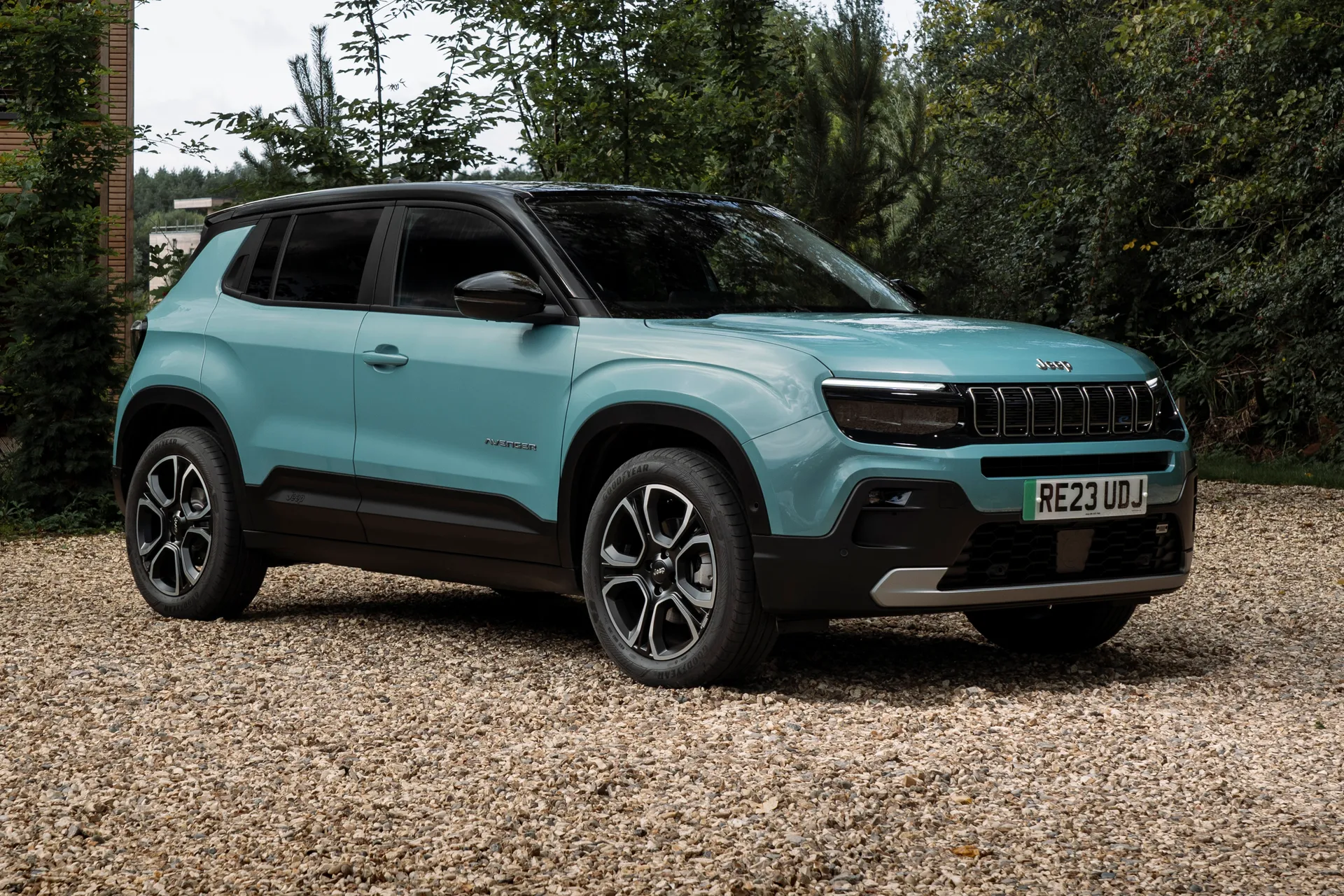
The Jeep Avenger also supports AC charging of up to 11kW, which allows a 0-100% charge in five and a half hours. However, most UK homes don’t have the three-phase electrics needed to support these speeds, meaning most owners’ home charging will happen at a maximum of 7.4kW. In this case, the same charge will take more like eight hours.
Prices for rapid charging vary wildly, but at the UK’s current average of 74p/kWh at the time of writing, that 20-80% top-up is likely to cost you around £35. A full 0-100% home charge at 27p/kWh will cost more like £14, where on the cheapest overnight tariffs, a full juice-up will cost little more than a fiver.
Jeep Avenger Electric reliability and warranty
Neither Jeep, nor the Avenger, featured in the latest HonestJohn.co.uk Satisfaction Index, so the reliability of the brand’s products is a little difficult to gauge at this stage.
The Jeep Avenger’s status as an all-electric car should be a positive for reliability in theory, because EVs have far fewer moving parts than combustion-engined cars, so there’s less potential for something to go wrong. That’s also the reason why the Avenger only needs routine maintenance work every two years or 16,000 miles, which is a long time between services. Jeep’s three-year, 60,000-mile warranty is nothing special, but the electric drivetrain has more comprehensive cover of eight years or 100,000 miles.
Jeep Avenger Electric insurance groups and costs
All versions of the Jeep Avenger get exactly the same powertrain, so it’s no surprise that there’s not much variation in insurance groupings. The lower-spec models sit in group 24, while the top-of-the-range Summit version sits in group 25. Since the cheapest grouping is group 1 and group 50 is the most expensive, you don’t get much more middle-of-the-road than that when it comes to insurance.
VED car tax: What is the annual road tax on a Jeep Avenger Electric?
Changes to the tax rules in April 2025 mean that if you're buying a brand new Avenger, you'll have to pay £10 in the first year. That extra tenner over the previous zero-rate tax won't make much difference, though from year two onwards, you'll have to stump up £195 a year, which is a bit more impactful.
The biggest tax-savers will be company car drivers. Fleet drivers currently pay Benefit-In-Kind company car tax on just 3% of the value of an electric car, meaning truly enormous savings compared to running a conventional petrol or diesel car.
Jeep Avenger Electric price
"Following a big price cut in late 2024, prices undercut many rivals, including the Hyundai Kona Electric, Peugeot e-2008 and Vauxhall Mokka. Used prices start at around £20,000."
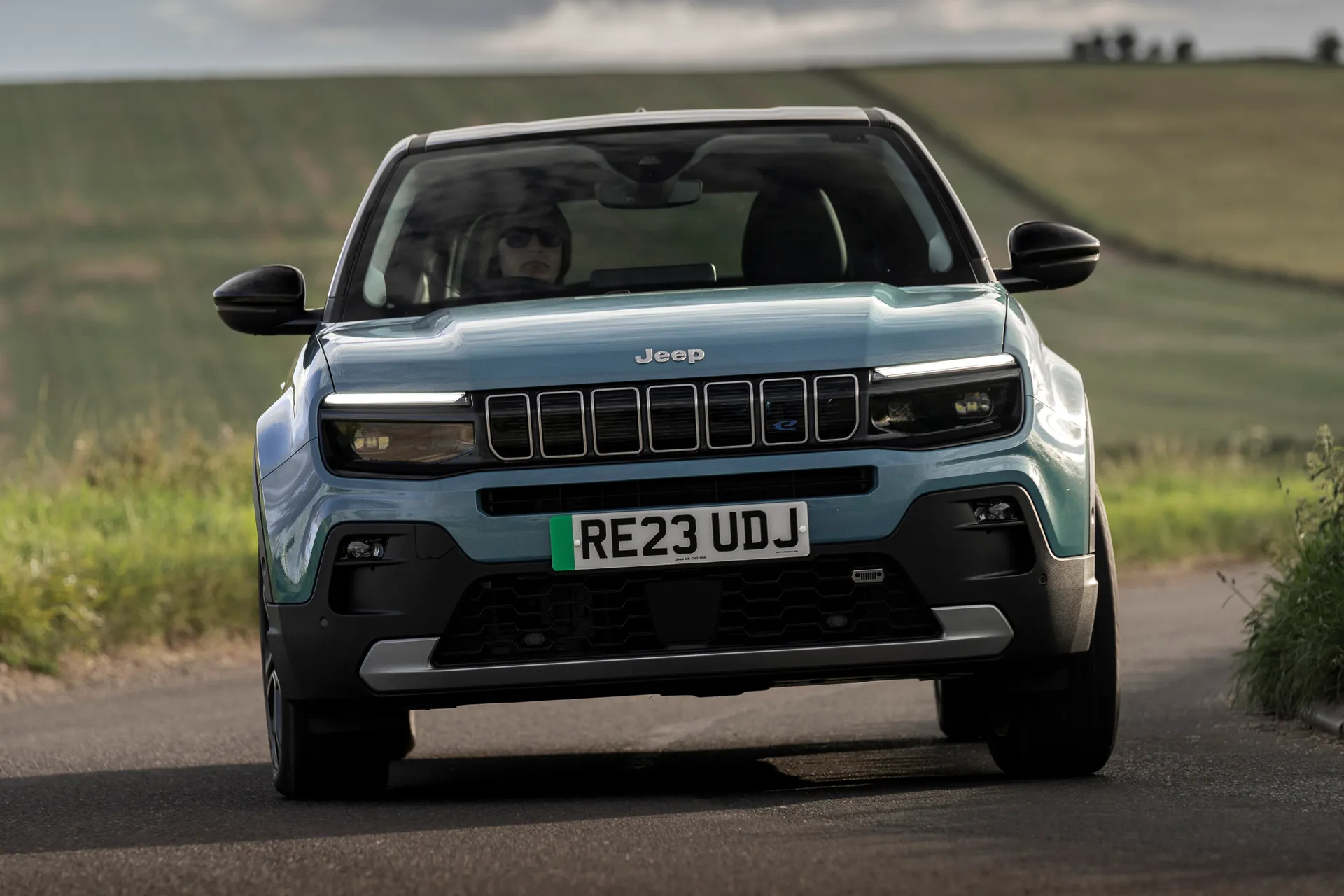
Prices for brand new examples of the Jeep Avenger start at just under £30,000 for the entry-level Longitude version, and rise to a shade below £34,000 for the range-topping Summit version, with the mid-spec Altitude sitting slap-bang in the middle. That follows a big price cut in late 2024 – all models were around £5000 more expensive before.
That means the Avenger now undercuts many of its rivals, including the Hyundai Kona Electric, which has similar range and power to the Avenger, the MINI Aceman, the Peugeot e-2008 and the Vauxhall Mokka Electric, both of which have marginally less power and range. However, it's about the same starting price as the forthcoming Ford Puma Gen-E.
The Jeep Avenger was only launched in early 2023, so prices on the used car market haven’t had much of a chance to come down by loads. At the time of writing, our listings featured a couple of cars with around 10,000 miles for around £20,000 and up.
Trim levels and standard equipment
The Jeep Avenger is offered in three different trim levels. The first of them is Longitude, and this version comes with a decent amount of standard equipment including 16-inch alloy wheels, LED headlights, heated and powered door mirrors, all-round electric windows, air-conditioning, automatic lights and wipers, keyless entry and start, rear parking sensors, cruise control and cloth seats.
Next up on the trim structure is Altitude trim, and this version gets a synthetic leather steering wheel,17-inch alloys, cloth and vinyl seats, a hands-free powered tailgate, adaptive cruise control and a reversing camera
Summit cars sit at the top of the range, and these have 18-inch alloys, heated front seats, front and side parking sensors, power folding door mirrors and automatic high beam headlights, along with an upgraded adaptive cruise control system that also supports lane centring and traffic jam assist.
The options list is short, but does include leather upholstery and a panoramic sunroof, both of which can be added to Altitude and Summit cars. A range of option packs are also available that bundle several features together.
Ask the heycar experts: common questions
Is the Jeep Avenger Electric a good car?
How much does the Jeep Avenger Electric cost?
What is the range of the Jeep Avenger Electric?
Get our latest advice, news and offers
Keep me updated by email with the latest advice, news and offers from heycar.
By submitting you agree to our privacy policy
